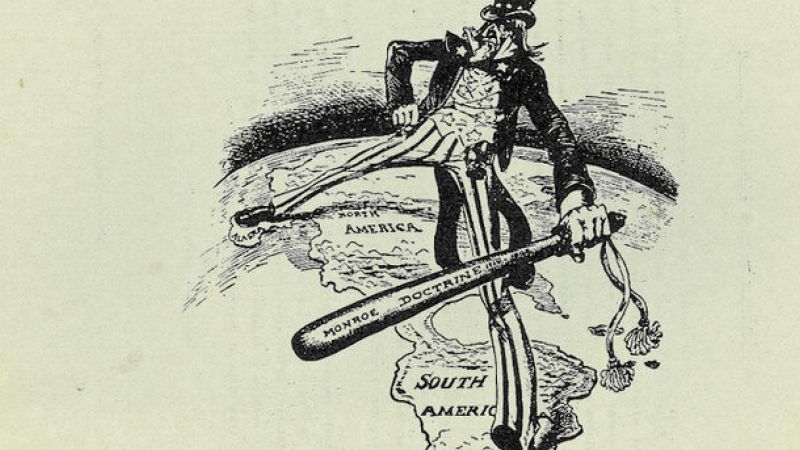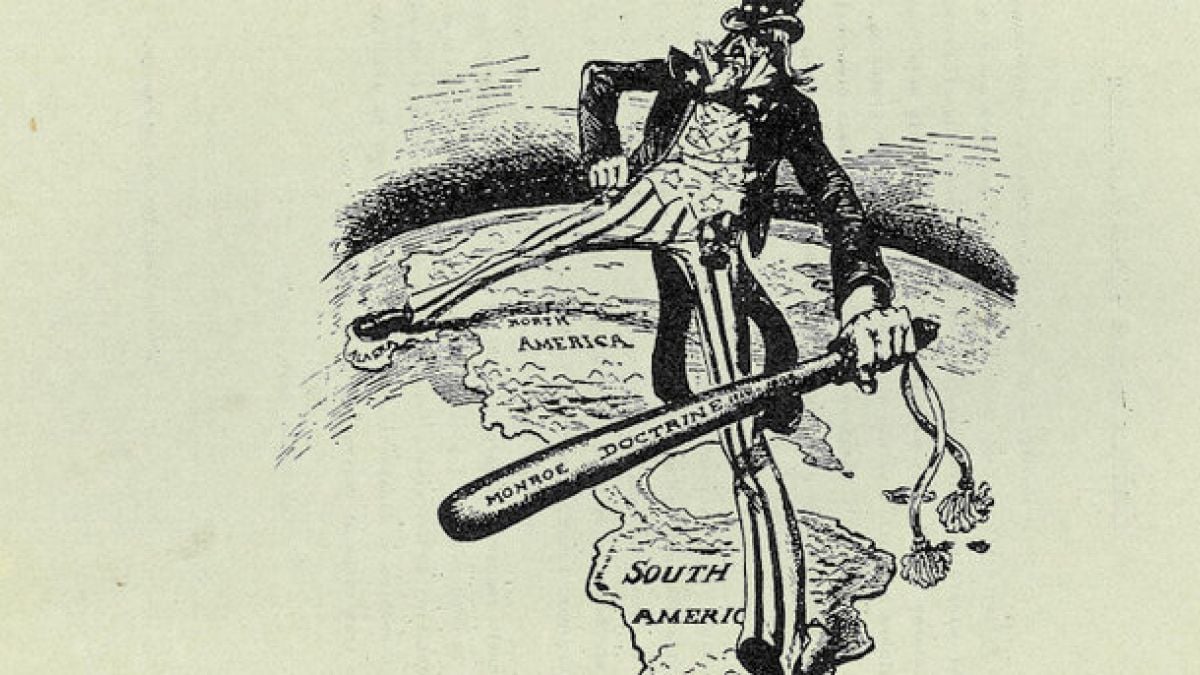201 years of the Monroe Doctrine and its regrettable validity


Internet

Published at: 02/12/2024 02:04 PM
The history of
Latin American countries has always been marked by a constant struggle between the
consolidation of their independence, autonomy and sovereign rights to free
self-determination and the ambitions of imperialist powers to plunder them.
In this context, the
Monroe Doctrine, proclaimed in December
1823, was presented as a new double-edged sword of American foreign policy, a
symbol of its expansionist ambitions and a tool that
was initially designed to protect the continent's independence, but which over
time became the foreign policy of the
Garrote or
The Big Stick.
Simon Bolivar, received the news about the enactment of
this U.S. foreign policy doctrine with great caution. Already in June
1817, following the confiscation of the American
merchant schooners Tigre and
Libertad on the Orinoco River, both full of weapons, ammunition and equipment for the Spanish armies, he wrote a forceful letter to the
emissary of the American government, J.B. Irving
response warning about
the hostile nature and the warlike nature of that country against the nascent
Republic of Gran Colombia.
Later, on August
5, 1828 , El Libertador Simón Bolívar was the
first to warn, prophetically,
of the dangers and threats that the United States would pose to the nations of Latin America and the world
when he exclaimed: “The United States seems destined by Providence to
plague America with misery in the name of freedom”.
This is a clear testimony of his distrust of the
true intentions of the American government . Bolívar understood that the struggle for independence did not end with the defeat of the European powers;
the new challenge would be to resist the advance
of the nascent imperialism of the United States.
The parallels today are represented by sanctions, the blockade, the siege of hunger,
interference in internal affairs and the constant threat of direct or mercenary military
intervention.
From the perspective of the Bolivarian Doctrine of Hugo Chávez, the comparison between the Monro Doctrine and the Bolivarian vision
of sovereignty and the current sanctions against Venezuela show the historical continuity of Yankee
imperialist aggression, the continuous resistance of the Peoples in defense of their territorial integrity, their cultural identity and the
dignity of those who make it up.
The Monroe
Doctrine: A Mask of Domination
The Monroe Doctrine , under the slogan “America for Americans”, was presented as an
anti-colonial statement that rejected the interference of European monarchies in the affairs of the continent.
However, this supposed defense of
American autonomy quickly transformed into a policy of expansion, surveillance, control
and punishment by the United States.
Instead of promoting the sovereignty of Peoples, it became a
tool to consolidate their hegemony over the Western
American hemisphere, leaving other nations relegated to the role of green areas in the imperial garden.
Nowadays, the aggression against Venezuela, under the guise of “defense of democracy” or
“protection of human rights”, is nothing more than a continuation of the Monroe Doctrine adapted to the 21st century.
The economic sanctions, promoted by the
United States and its allies, represent an act of economic war whose objective
is to subdue the Venezuelan people, destabilize their government and take control of
their strategic resources, particularly oil, gold, coltan, water and forest resources.
These unilateral coercive measures, which
violate the principles of international law and the self-determination of
peoples, have caused serious consequences in the Venezuelan economy, especially
affecting the most vulnerable sectors. However, instead
of destroying the Bolivarian Revolution ,
they have strengthened Venezuelan resistance, just as Bolivar dreamed of when he
fought against the Spanish Empire and the European Triple Alliance.
The
Bolivarian response to unilateral and coercive measures is summarized in Hugo Chávez's
last great message , on December
8, 2012: “Unity, Struggle,
Battle and Victory”. In other words, the unwavering resolve to resist the imperialist blows together,
with the unwavering certainty that the unstoppable forces of history will give us the great total victory.
It is “the triumph of Freedom over despotism” as the title of Juan Germán Roscio's book states.
Since the arrival of Commander Hugo Chávez to power in 1999, the Bolivarian
project has steadfastly confronted imperialist threats,
promoting a policy of full sovereignty, regional integration and social justice.
In this context, the sanctions and blockades imposed by the United States are nothing more than an
attempt to punish a country that has decided to be free and sovereign.
Chavism has constantly invoked Bolívar's legacy as a symbol
of anti-imperialist struggle.
The popular civic-military fusion, the diversification of international
alliances through organizations such as BRICKS, ALBA, CELAC, UNASUR and the strengthening
of ties with emerging powers such as Russia, China, India, Iran,
Vietnam and Turkey are modern Bolivarian strategies
to counteract the isolationism to which they want to subject us.
The Monroe
Doctrine and Imperialist Continuity
From the Chavista perspective, the Monroe Doctrine is still in force in the
actions of the United States, which
continues to use different forms of intervention to to subjugate the Peoples of Latin America. Soft
coups, media manipulation, economic sanctions and
attempts at diplomatic isolation are new tools to perpetuate the
same logic of imperialist domination denounced by Bolívar two centuries ago.
Venezuela, as a bastion of anti-imperialist resistance in the
region, has become a strategic target of imperialism.
However, just as Bolívar fought against colonial forces in his time,
the Venezuelan people are still fighting against modern aggressions today,
defending their right to build their own social, economic and political model.
Conclusion: Bolívar Lives in
Revolutionary Resistance
The comparison between the Mon Roe Doctrine, Simon Bolivar's warnings and the current sanctions against Venezuela show that
the fight for sovereignty and self-determination remain as relevant
today as it was in the 19th and 20th centuries.
From the Chavista perspective, the spirit of Bolívar lives in the resistance of the Venezuelan
people, who, in the face of adversities imposed by
imperialism, remain firm in the construction of a free, just and sovereign Homeland.
History teaches us that empires can
attempt to subdue Peoples, but they can never extinguish their desire for freedom.
Venezuela, with its Bolivarian Revolution, today embodies that
spirit of resistance and reaffirms Bolivar's dream of a united, sovereign and independent
Latin America.
Mazo News Team